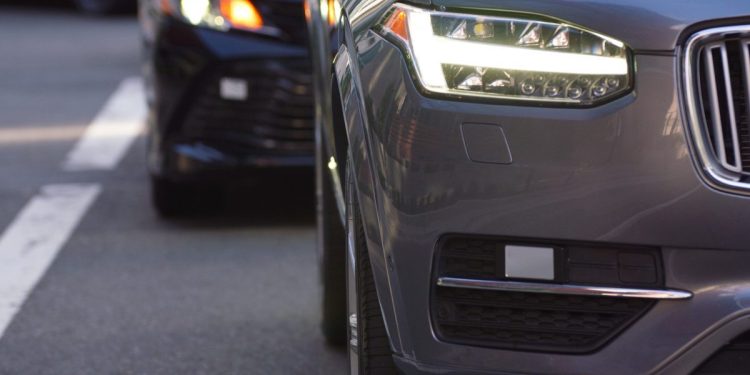Luminar Technologies today announced a partnership with Volvo that will see the former’s lidar sensors integrated into the roof of the automaker’s Scalable Product Architecture 2 (SPA2) vehicle platform, which is expected to launch in 2022. The two companies also plan to explore the sensors’ role in improving future advanced driver assistance systems (ADAS), with the potential for equipping select future Volvo cars with lidar sensors as standard.
Volvo — which says it’s also reserving the right to increase its minority stake in Luminar — confirmed the company as a public partner and a “significant” investor two years ago, but the carmaker’s commitment promises to kick off the largest commercial launch of Luminar’s tech to date. That’s good news not only for Luminar but for future Volvo customers, potentially, who stand to reap the benefits of the sophisticated Iris lidar system.
Luminar’s Iris is a full-stack platform and ADAS add-on developed by a team of engineers in Palo Alto, California and Orlando, Florida, led by VP of software Christoph Schroeder, the former head of R&D from Mercedes-Benz’s North America division. Iris bundles hardware and software into a single package, and it comes in two flavors: a more technologically sophisticated version that powers hands-free “freeway autonomy,” and a cheaper ADAS version that provides autonomous functions like emergency braking and steering.
Volvo says that Iris — in tandem with cameras, radars, and backup systems for steering, braking, and power — will underpin the SPA2’s Highway Pilot feature, which is designed to enable fully autonomous highway driving in specific locations and conditions. (Volvo originally planned to launch Highway Pilot in 2021 with its XC90 SUVs, but production is now expected to begin in 2022.) Volvo SVP of research and development Henrik Green previously said that Highway Pilot will be an optional over-the-air upgrade for car owners and cost around “four figures.”
June 5th: The AI Audit in NYC
Join us next week in NYC to engage with top executive leaders, delving into strategies for auditing AI models to ensure fairness, optimal performance, and ethical compliance across diverse organizations. Secure your attendance for this exclusive invite-only event.
“Soon, your Volvo will be able to drive autonomously on highways when the car determines it is safe to do so,” said Green in a statement. “At that point, your Volvo takes responsibility for the driving and you can relax, take your eyes off the road and your hands off the wheel. Over time, updates over the air will expand the areas in which the car can drive itself. For us, a safe introduction of autonomy is a gradual introduction.”
Compared with rivals like Alphabet’s Waymo, Volvo’s path toward fully driverless cars has been riddled with setbacks and detours. The Sweden-based automaker, which sells ADAS solutions to Daimler, Ford, and Honda, among others, pushed back plans to provide families in Sweden, U.K., and China access to driverless vehicles as a part of a pilot program, and it recently said it would split its autonomous driving development arm Zenuity into two separate entities in a bid to accelerate development of its Pilot Assist self-driving system.
As for Luminar, the strengthened collaboration with Volvo comes after the debut of Hydra, a subscription-based lidar platform for highway scenarios. During Hydra’s unveiling at the 2020 Consumer Electronics Show, Luminar claimed it has a range of up to 500 meters and uses only 30 watts of power.
Luminar previously worked with Autonomous Intelligent Driving (AID), Audi’s driverless technology spinoff and a supplier for Volkswagen Group brands like VW and Porsche, to outfit prototypical vehicles with object-detecting lidar sensors. The two firms have also tested fleets with forward vision systems powered by Luminar’s sensors.
Beyond Audi and Volvo, Luminar says it’s actively working with 40 automotive partners and 12 of the world’s 15 largest auto OEMs, and that it now has 80 patents and a team of over 350 across Palo Alto, Orlando, and Colorado Springs. Contracts for its Iris system alone are worth more than $1.5 billion combined, claims Luminar.
The lidar market is projected to be worth $1.8 billion in just five years, and it’s a crowded field, to say the least. Innoviz raised $38 million in June, following financing tranches by Oryx and TetraVue. Lidar startup Baraja last January raised $32 million for its innovative prism-like optics design, and Alphabet subsidiary Waymo said last year that it would begin selling its proprietary near-range, 360-degree lidar design — Laser Bear Honeycomb — to “dozens” of customers. That’s not to mention far-infrared pioneer AdaSky, ground-penetrating radar startup WaveSense, and velocity-measuring sensor company Aeva, all three of which seek to develop technologies that complement traditional vision-based autonomous car perception systems.

